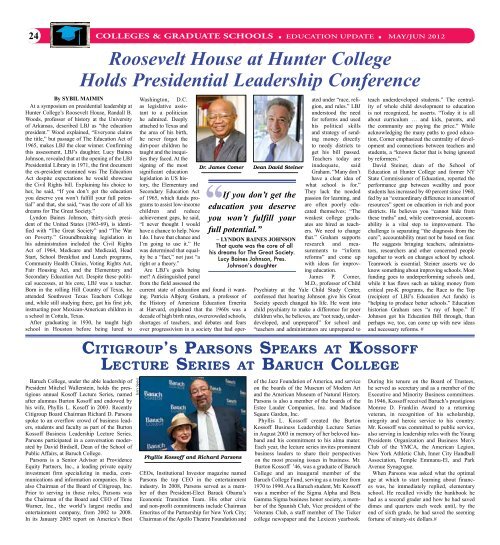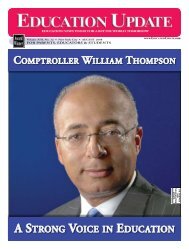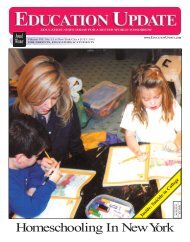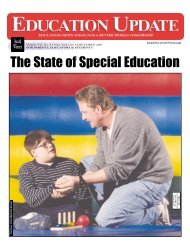You also want an ePaper? Increase the reach of your titles
YUMPU automatically turns print PDFs into web optimized ePapers that Google loves.
24 COLLEGES & GRADuate Schools ■ EDUCATION UPDATE ■ MAY/JUN 2012Roosevelt House at Hunter CollegeHolds Presidential Leadership ConferenceBy Sybil MaiminAt a symposium on presidential leadership atHunter College’s Roosevelt House, Randall B.Woods, professor of history at the Universityof Arkansas, described LBJ as “the educationpresident.” Wood explained, “Everyone claimsthe title,” but passage of The <strong>Education</strong> Act of1965, makes LBJ the clear winner. Confirmingthis assessment, LBJ’s daughter, Lucy BainesJohnson, revealed that at the opening of the LBJPresidential Library in 1971, the first documentthe ex-president examined was The <strong>Education</strong>Act despite expectations he would showcasethe Civil Rights bill. Explaining his choice toher, he said, “If you don’t get the educationyou deserve you won’t fulfill your full potential”and that, she said, “was the core of all hisdreams for The Great Society.”Lyndon Baines Johnson, thirty-sixth presidentof the United States (1963-69), is identifiedwith “The Great Society” and “The Waron Poverty.” Groundbreaking legislation inhis administration included the Civil RightsAct of 1964, Medicare and Medicaid, HeadStart, School Breakfast and Lunch programs,Community Health Clinics, Voting Rights Act,Fair Housing Act, and the Elementary andSecondary <strong>Education</strong> Act. Despite these politicalsuccesses, at his core, LBJ was a teacher.Born in the rolling Hill Country of Texas, heattended Southwest Texas Teachers Collegeand, while still studying there, got his first job,instructing poor Mexican-American children ina school in Cottula, Texas.After graduating in 1930, he taught highschool in Houston before being lured toWashington, D.C.as legislative assistantto a politicianhe admired. Deeplyattached to Texas andthe area of his birth,he never forgot thedirt-poor children hetaught and the inequitiesthey faced. At thesigning of the mostsignificant educationlegislation in US history,the Elementary andSecondary <strong>Education</strong> Actof 1965, which funds programsto assist low-incomechildren and reduceachievement gaps, he said,“I never thought I wouldhave a chance to help. NowI do. I have that chance andI’m going to use it.” Hewas determined that equalitybe a “fact,” not just “aright or a theory.”Are LBJ’s goals beingmet? A distinguished panelfrom the field assessed theDr. James Comer‘‘If you don’t get theeducation you deserveyou won’t fulfill yourfull potential.”current state of education and found it wanting.Patricia Albjerg Graham, a professor ofthe History of American <strong>Education</strong> Emeritaat Harvard, explained that the 1960s was adecade of high birth rates, overcrowded schools,shortages of teachers, and debates and fearsover progressivism in a society that had operatedunder “race, religion,and rules.” LBJunderstood the needfor reforms and usedhis political skillsand strategy of sendingmoney directlyto needy districts toget his bill passed.Teachers today areDean David Steiner inadequate, saidGraham. “Many don’thave a clear idea ofwhat school is for.”They lack the neededpassion for learning, andare often poorly educatedthemselves; “Theweakest college graduatesare hired as teachers.We need to changethat.” Graham supportsresearch and measurementsto “informreforms” and come upwith ideas for improvingeducation.James P. Comer,M.D., professor of ChildPsychiatry at the Yale Child Study Center,confessed that hearing Johnson give his GreatSociety speech changed his life. He went intochild psychiatry to make a difference for poorchildren who, he believes, are “not ready, underdeveloped,and unprepared” for school and“teachers and administrators are unprepared to– Lyndon Baines JohnsonThat quote was the core of allhis dreams for The Great Society.Lucy Baines Johnson, Pres.Johnson’s daughterCitigroup’s Parsons Speaks at KossoffLecture Series at Baruch Collegeteach underdeveloped students.” The centralityof whole child development to educationis not recognized, he asserts. “Today it is allabout curriculum … and kids, parents, andthe community are paying the price.” Whileacknowledging the many paths to good education,Comer emphasized the centrality of developmentand connections between teachers andstudents, a “known factor that is being ignoredby reformers.”David Steiner, dean of the School of<strong>Education</strong> at Hunter College and former NYState Commissioner of <strong>Education</strong>, reported theperformance gap between wealthy and poorstudents has increased by 40 percent since 1960,fed by an “extraordinary difference in amount ofresources” spent on education in rich and poordistricts. He believes you “cannot hide fromthese truths” and, while controversial, accountabilityis a vital step to improvement. Thechallenge is separating “the diagnosis from thecure”; accountability must not be based on fear.He suggests bringing teachers, administrators,researchers and other concerned peopletogether to work on changes school by school.Teamwork is essential. Steiner asserts we doknow something about improving schools. Mostfunding goes to underperforming schools and,while it has flaws such as taking money fromcritical pre-K programs, the Race to the Top(recipient of LBJ’s <strong>Education</strong> Act funds) is“helping to produce better schools.” <strong>Education</strong>historian Graham sees “a ray of hope.” IfJohnson got his <strong>Education</strong> Bill through, thanperhaps we, too, can come up with new ideasand necessary reforms. #Baruch College, under the able leadership ofPresident Mitchel Wallerstein, holds the prestigiousannual Kosoff Lecture Series, namedafter alumnus Burton Kosoff and endowed byhis wife, Phyllis L. Kosoff in 2003. RecentlyCitigroup Board Chairman Richard D. Parsonsspoke to an overflow crowd of business leaders,students and faculty as part of the BurtonKossoff Business Leadership Lecture Series.Parsons participated in a conversation moderatedby David Birdsell, Dean of the School ofPublic Affairs, at Baruch College.Parsons is a Senior Advisor at ProvidenceEquity Partners, Inc., a leading private equityinvestment firm specializing in media, communicationsand information companies. He isalso Chairman of the Board of Citigroup, Inc.Prior to serving in those roles, Parsons wasthe Chairman of the Board and CEO of TimeWarner, Inc., the world’s largest media andentertainment company, from 2002 to 2008.In its January 2005 report on America’s BestJerry SpeierPhyllis Kossoff and Richard ParsonsCEOs, Institutional Investor magazine namedParsons the top CEO in the entertainmentindustry. In 2008, Parsons served as a memberof then President-Elect Barack Obama’sEconomic Transition Team. His other civicand non-profit commitments include ChairmanEmeritus of the Partnership for New York City;Chairman of the Apollo Theatre Foundation andof the Jazz Foundation of America, and serviceon the boards of the Museum of Modern Artand the American Museum of Natural History.Parsons is also a member of the boards of theEstee Lauder Companies, Inc. and MadisonSquare Garden, Inc.Phyllis L. Kossoff created the BurtonKossoff Business Leadership Lecture Seriesin August 2003 in memory of her beloved husbandand his commitment to his alma mater.Each year, the lecture series invites prominentbusiness leaders to share their perspectiveson the most pressing issues in business. Mr.Burton Kossoff ’46, was a graduate of BaruchCollege and an inaugural member of theBaruch College Fund, serving as a trustee from1970 to 1990. As a Baruch student, Mr. Kossoffwas a member of the Sigma Alpha and BetaGamma Sigma business honor society, a memberof the Spanish Club, Vice president of theVeterans Club, a staff member of The Tickercollege newspaper and the Lexicon yearbook.During his tenure on the Board of Trustees,he served as secretary and as a member of theExecutive and Minority Business committees.In 1946, Kossoff received Baruch’s prestigiousMonroe D. Franklin Award to a returningveteran, in recognition of his scholarship,integrity and heroic service to his country.Mr. Kossoff was committed to public service,also serving in leadership roles with the YoungPresidents Organization and Business Men’sClub of the YMCA, the American Legion,New York Athletic Club, Inner City HandballAssociation, Temple Emmanu-El, and ParkAvenue Synagogue.When Parsons was asked what the optimalage at which to start learning about financeswas, he immediately replied, elementaryschool. He recalled vividly the bankbook hehad as a second grader and how he had saveddimes and quarters each week until, by theend of sixth grade, he had saved the seemingfortune of ninety-six dollars.#

















